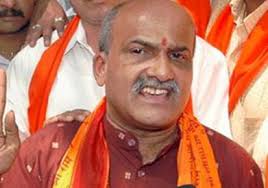Chikkamgaluru, Nov 22: The district administration has filed a case against Sri Ram Sene founder Pramod Muthalik and others for staging a protest inside the Guru Dattatreya Bababudan Swamy Dargah atop Bababudangiri Hills during the valedictory function of Dattamala Abhiyana on Sunday.
 A case has been registered by the Chikkamagaluru Rural police on charges of assaulting a public servant (Section 353 of the IPC), obstructing a public servant from discharging duties (Section 186), and disobedience of order passed by a public servant (Section 188).
A case has been registered by the Chikkamagaluru Rural police on charges of assaulting a public servant (Section 353 of the IPC), obstructing a public servant from discharging duties (Section 186), and disobedience of order passed by a public servant (Section 188).
It was registered based on a complaint filed by S.G. Nagesh, Deputy Director of Public Instruction, who was deputed as a special officer to the shrine. The other accused are Mahesh Kumar Kattinamane, Sharadamma and Mohan Kumar.
Superintendent of Police K. Annamalai said the accused had allegedly staged a dharna in the shrine seeking an opportunity to offer prayers to Datta Paduka, despite being aware of the court's order on this issue. They attempted to disturb peace and also obstructed other devotees from havingPaduka Darshana'.




Comments
Encounter is the only solution to finish such criminals like
no one is there to raise voice against this trouble maker in all over karnataka... y dont punish this guy..? he shld be bhind the bar... until his last breath shld not come out frm there
where are his followers gone
Government of India must Ban this type of anti national elements and should put them behind bars without granting any bail. He should be put behind bars atleast for 10 to 15 years.
Add new comment